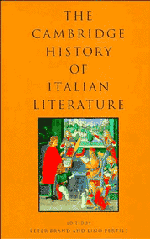Book contents
- Frontmatter
- Origins and Duecento
- The Trecento
- The Quattrocento
- The Cinquecento
- The Seicento: Poetry, Philosophy and Science
- Narrative prose and theatre
- The Settecento
- The Age of Romanticism (1800–1870)
- 27 The Romantic controversy
- 28 Monti
- 29 Foscolo
- 30 Leopardi
- 31 Manzoni and the novel
- 32 Other novelists and poets of the Risorgimento
- 33 Opera since 1800
- The Literature of United Italy (1870–1910)
- The Rise and Fall of Fascism (1910–45)
- The Aftermath of the Second World War (1945–56)
- Contemporary Italy (since 1956)
- Bibliography
- References
28 - Monti
from The Age of Romanticism (1800–1870)
Published online by Cambridge University Press: 28 March 2008
- Frontmatter
- Origins and Duecento
- The Trecento
- The Quattrocento
- The Cinquecento
- The Seicento: Poetry, Philosophy and Science
- Narrative prose and theatre
- The Settecento
- The Age of Romanticism (1800–1870)
- 27 The Romantic controversy
- 28 Monti
- 29 Foscolo
- 30 Leopardi
- 31 Manzoni and the novel
- 32 Other novelists and poets of the Risorgimento
- 33 Opera since 1800
- The Literature of United Italy (1870–1910)
- The Rise and Fall of Fascism (1910–45)
- The Aftermath of the Second World War (1945–56)
- Contemporary Italy (since 1956)
- Bibliography
- References
Summary
Changing sides: the Bassville affair
In July 1825, nearly a decade after the appearance of Madame de Staël' article, Vincenzo Monti (1754–1828) reopened the whole debate on classicism and Romanticism, which had been quiescent for some time, with Sulla mitologia, a poetic discourse (sermone) defending the use of mythology in poetry. Monti's leading position in the Italian Parnassus was by then unassailable, though in an age when writers were not above trading insults with one another, he had received his share of obloquy. He had made enemies by surviving and prospering through an age of revolutions and reversals, witnessing the collapse of the old order, the Napoleonic wars, the various political changes from Republic to Empire under French rule, and the restoration of the old order after Napoleon's final defeat. None of these changes had been radical and complete. Napoleon had not made the old social structure obsolete. The Restoration could not undo much of what Napoleon had achieved. True, some of the most persistent and dangerous opponents of each régime had been persecuted, imprisoned or executed; yet many members of the ruling and cultured classes had, by necessity, been left in place or allowed to re-emerge after a short period of obscurity, in order to ensure reasonably efficient administration and transfer of powers. Many proto-industrialists, landowners, lawyers, booksellers, printers, army officers, politicians, and even a few artists and writers besides Monti had been able to live through the changes reasonably unscathed, and had adapted to each new master's demands without necessarily attracting the reputation of spineless turncoats or creating a critical or historical ‘problem’.
- Type
- Chapter
- Information
- The Cambridge History of Italian Literature , pp. 406 - 411Publisher: Cambridge University PressPrint publication year: 1997



